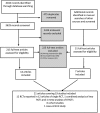Cancer risk with folic acid supplements: a systematic review and meta-analysis
- PMID: 22240654
- PMCID: PMC3278486
- DOI: 10.1136/bmjopen-2011-000653
Cancer risk with folic acid supplements: a systematic review and meta-analysis
Abstract
Objective To explore if there is an increased cancer risk associated with folic acid supplements given orally. Design Systematic review and meta-analysis of controlled studies of folic acid supplementation in humans reporting cancer incidence and/or cancer mortality. Studies on folic acid fortification of foods were not included. Data sources Cochrane Library, Medline, Embase and Centre of Reviews and Dissemination, clinical trial registries and hand-searching of key journals. Results From 4104 potential references, 19 studies contributed data to our meta-analyses, including 12 randomised controlled trials (RCTs). Meta-analysis of the 10 RCTs reporting overall cancer incidence (N=38 233) gave an RR of developing cancer in patients randomised to folic acid supplements of 1.07 (95% CI 1.00 to 1.14) compared to controls. Overall cancer incidence was not reported in the seven observational studies. Meta-analyses of six RCTs reporting prostate cancer incidence showed an RR of prostate cancer of 1.24 (95% CI 1.03 to 1.49) for the men receiving folic acid compared to controls. No significant difference in cancer incidence was shown between groups receiving folic acid and placebo/control group, for any other cancer type. Total cancer mortality was reported in six RCTs, and a meta-analysis of these did not show any significant difference in cancer mortality in folic acid supplemented groups compared to controls (RR 1.09, 95% CI 0.90 to 1.30). None of the observational studies addressed mortality. Conclusions A meta-analysis of 10 RCTs showed a borderline significant increase in frequency of overall cancer in the folic acid group compared to controls. Overall cancer incidence was not reported in the seven observational studies. Prostate cancer was the only cancer type found to be increased after folic acid supplementation (meta-analyses of six RCTs). Prospective studies of cancer development in populations where food is fortified with folic acid could indicate whether fortification similar to supplementation moderately increases prostate cancer risk.
Conflict of interest statement
Figures




Similar articles
-
Folic Acid Supplementation: An Evidence Review for the U.S. Preventive Services Task Force [Internet].Rockville (MD): Agency for Healthcare Research and Quality (US); 2017 Jan. Report No.: 14-05214-EF-1. Rockville (MD): Agency for Healthcare Research and Quality (US); 2017 Jan. Report No.: 14-05214-EF-1. PMID: 28151610 Free Books & Documents. Review.
-
Cancer Risk with Folic Acid Supplements [Internet].Oslo, Norway: Knowledge Centre for the Health Services at The Norwegian Institute of Public Health (NIPH); 2011 Dec. Report from Norwegian Knowledge Centre for the Health Services (NOKC) No. 25-2011. Oslo, Norway: Knowledge Centre for the Health Services at The Norwegian Institute of Public Health (NIPH); 2011 Dec. Report from Norwegian Knowledge Centre for the Health Services (NOKC) No. 25-2011. PMID: 29320118 Free Books & Documents. Review.
-
Calcium supplementation commencing before or early in pregnancy, or food fortification with calcium, for preventing hypertensive disorders of pregnancy.Cochrane Database Syst Rev. 2017 Sep 26;9(9):CD011192. doi: 10.1002/14651858.CD011192.pub2. Cochrane Database Syst Rev. 2017. Update in: Cochrane Database Syst Rev. 2019 Sep 16;9:CD011192. doi: 10.1002/14651858.CD011192.pub3. PMID: 28949421 Free PMC article. Updated. Review.
-
Chemoprevention of colorectal cancer: systematic review and economic evaluation.Health Technol Assess. 2010 Jun;14(32):1-206. doi: 10.3310/hta14320. Health Technol Assess. 2010. PMID: 20594533 Review.
-
Folic acid to reduce neonatal mortality from neural tube disorders.Int J Epidemiol. 2010 Apr;39 Suppl 1(Suppl 1):i110-21. doi: 10.1093/ije/dyq028. Int J Epidemiol. 2010. PMID: 20348114 Free PMC article. Review.
Cited by
-
Comparative effectiveness of chemopreventive interventions for colorectal cancer: protocol for a systematic review and network meta-analysis of randomised controlled trials.J Gastrointest Oncol. 2016 Aug;7(4):595-602. doi: 10.21037/jgo.2016.04.02. J Gastrointest Oncol. 2016. PMID: 27563450 Free PMC article.
-
Vitamin and Mineral Supplement Use among Korean Adults: Baseline Data from the Trace Element Study of Korean Adults in Yeungnam Area.Nutrients. 2018 Jan 6;10(1):50. doi: 10.3390/nu10010050. Nutrients. 2018. PMID: 29316608 Free PMC article.
-
Tumour suppressor gene methylation and cervical cell folate concentration are determinants of high-risk human papillomavirus persistence: a nested case control study.BMC Cancer. 2014 Nov 3;14:803. doi: 10.1186/1471-2407-14-803. BMC Cancer. 2014. PMID: 25367268 Free PMC article.
-
Association between vitamin B2 intake and prostate-specific antigen in American men: 2003-2010 National Health and Nutrition Examination Survey.BMC Public Health. 2024 May 3;24(1):1224. doi: 10.1186/s12889-024-18582-y. BMC Public Health. 2024. PMID: 38702746 Free PMC article.
-
Plant-based nutrition for healthcare professionals: implementing diet as a primary modality in the prevention and treatment of chronic disease.J Geriatr Cardiol. 2017 May;14(5):355-368. doi: 10.11909/j.issn.1671-5411.2017.05.012. J Geriatr Cardiol. 2017. PMID: 28630615 Free PMC article. Review.
References
-
- Avdeling for Legemiddelepidemiologi Divisjon for Epidemiologi Nasjonalt Folkehelseinstitutt. Drug Consumption in Norway 2005-2009. 2010. http://www.legemiddelforbruk.no/ (accessed 17 Mar 2011).
-
- Graham IM, Daly LE, Refsum HM, et al. Plasma homocysteine as a risk factor for vascular disease. The European Concerted Action Project. JAMA 1997;277:1775–81 - PubMed
-
- Clarke R, Halsey J, Lewington S, et al. Effects of lowering homocysteine levels with B vitamins on cardiovascular disease, cancer, and cause-specific mortality: meta-analysis of 8 randomized trials involving 37 485 individuals. Arch Intern Med 2010;170:1622–31 - PubMed
-
- Bazzano LA, Reynolds K, Holder KN, et al. Effect of folic acid supplementation on risk of cardiovascular diseases: a meta-analysis of randomized controlled trials. JAMA 2006;296:2720–6 - PubMed
LinkOut - more resources
Full Text Sources
Other Literature Sources
